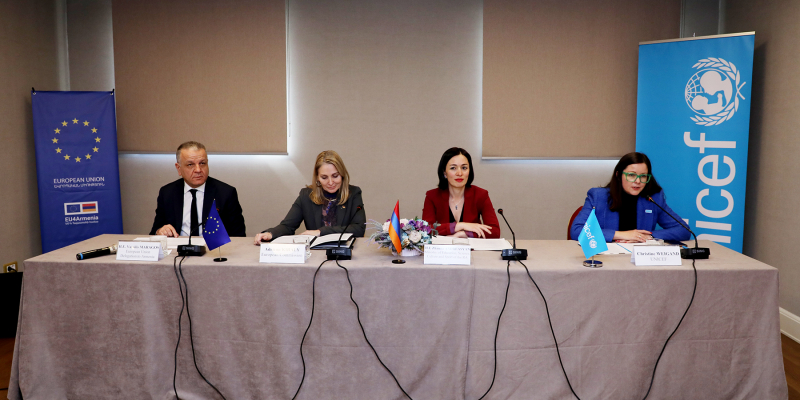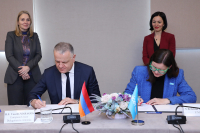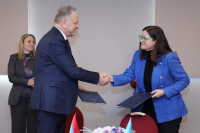The European Union and the United Nations Children's Fund (UNICEF) signed an agreement marking the launch of the EU4Education Reforms program to promote effective reform of the RA education system.
Under the European Union's budget support agreement, UNICEF will provide additional technical assistance to the RA ESCS Ministry for programs targeted at enhancing education quality, infrastructure, and accessibility.
The agreement was signed by the Head of the EU Delegation to the Republic of Armenia, Ambassador Vassilis Maragos and the UNICEF Representative in Armenia Christine Weigand.
RA Minister of Education, Science, Culture and Sports Zhanna Andreasyan, Director for Neighborhood East and Institution Building of the Directorate-General for Neighborhood and Enlargement Negotiations of the European Commission Adrienn Kiraly, ESCS Deputy Ministers Arthur Martirosyan and Araksia Svajyan and other stakeholders attended the event.
Welcoming the participants, ESCS Minister Zhanna Andreasyan emphasized the significance of productive cooperation with the United Nations Children's Fund and the European Union across diverse areas to advance education reforms in Armenia, which, according to the Minister, stand as key priorities for the RA Government and are under constant scrutiny.
Zhanna Andreasyan observed that significant reforms have been implemented in the education sector recently with the objectives of enhancing infrastructure, raising accessibility standards, and enhancing education quality. The ESCS Minister stated that the “RA Education Development State Program until 2030” action plan was approved in 2023 to better coordinate the implementation of reforms and steps in the field aimed at achieving the set goals. The plan outlines specific objectives and a schedule for state policy at all levels of education, aligning with the objectives of the UN Sustainable Development Goals 4.
“The state budget earmarks resources for educational reforms and their execution with a significant increase in allocation. However, the budget support from the European Union complements these efforts, fostering the successful implementation of our initiatives,” stated Zhanna Andreasyan.
Note that the EU Agreement on budget support covers all schools in the Ararat, Kotayk and Gegharkunik regions, as well as 13 general education institutions in the cities of Kapan and Goris of the Syunik region. A total of 337 schools will have renovated and equipped STEM laboratories, trained teachers, and updated training methodology.
It will assist in implementing the RA Government's action plan, which includes school construction and renovation. As part of the cooperation, work will also be carried out to improve the national student learning outcomes assessment system.
Zhanna Andreasyan expressed confidence that additional technical support will ensure the efficient implementation of the “RA Education Development State Program until 2030”.
The ESCS Minister also expressed gratitude to the Delegation of the European Union to the Republic of Armenia and the Office of the United Nations Children's Fund in Armenia for their ongoing support and productive collaboration in educational reforms.
“Through EU4Education Reforms, the European Union will help Armenia develop a well-managed education system tailored to the needs of youth and the labour market. In the long term, we hope to reduce youth unemployment, particularly among marginalized social groups and create a vibrant, well-educated, and well-trained labour force capable of contributing to the growth and green and digital transition of Armenia,” noted Mr Vassilis Maragos, Ambassador of the European Union to Armenia.
According to the Director for Neighborhood East and Institution Building of the Directorate-General for Neighborhood and Enlargement Negotiations of the European Commission Adrienn Kiraly, supporting the well-functioning of the education system in Armenia has been a long-standing priority for the European Union: “Access to quality education is at the heart of a resilient and prosperous society, and is especially important in rural areas. Together with the Ministry of Education, Science, Culture and Sports and UNICEF, this program will be crucial to continue driving forward the new national education strategy by also supporting teachers and students in taking leadership and contributing to the education reforms”.
The participants were also welcomed by UNICEF representative in Armenia, Christine Weigand: “Central to our approach is the prioritization of data-driven decision-making, policy advocacy, and meaningful youth engagement. In collaboration with the EU, our shared objective extends beyond enhancing education quality; it is about nurturing a generation of empowered change-makers. UNICEF is committed to supporting Armenia’s efforts to modernize its education system to provide all children and youth with inclusive quality education.”












